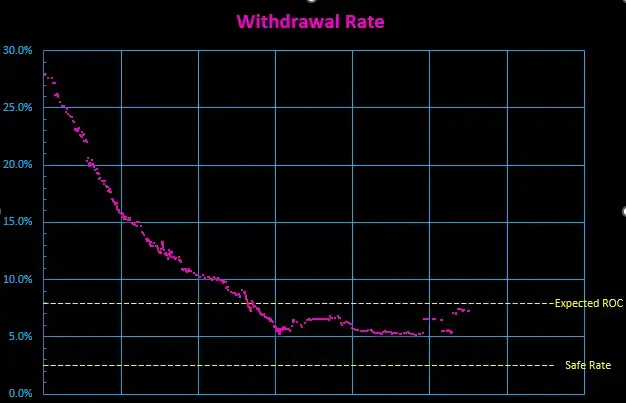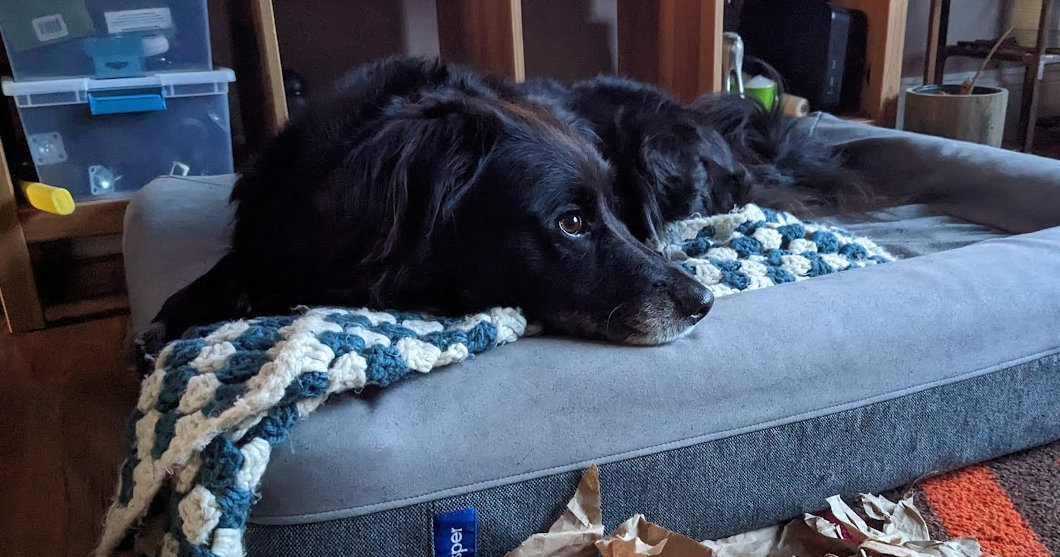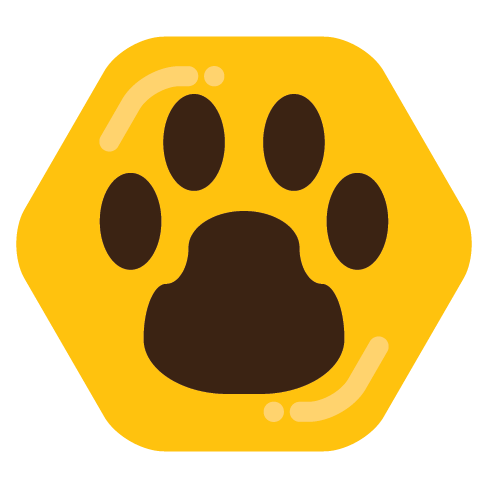I just got this game and I’m having a blast, this is the style of game I’ve been hungry for for a long time.
- 4 Posts
- 24 Comments

 1·1 year ago
1·1 year ago500 internal errors in console, video doesn’t play
Office is weird about it because of their OneDrive product
This is not answering your question (I can’t argue for my current SWR, it’s the trinity study minus a random fudge factor), but I’ve implemented an idea that I think others would benefit from.
I’ve been tracking my current withdrawal rate through time, based on my periodic calculation of baseline expenses. I suppose I could use actual expenses, but that’s remarkably volatile, so instead I take the 6 month average of recurring costs.
The benefit is a nice time series graph I can watch. I can plot a horizontal line for my current expected return on capital, and another for my safe withdrawal rate.
The net result is a lot of information condensed nicely. You can see at a glance if you’re trending towards safety, or away from it.


 2·1 year ago
2·1 year agoit crashed the first time I tried to reply to this post
“The Lemmy Overseer” as I understand it is a backend service that gives us an API to use.
There is an open-source script for interacting with it. However, it does not tell you how that backend service works, exactly. It’s a black box with well defined interfaces, best case, as I understand it.
Important question; author kind of answers here:
https://lemmy.dbzer0.com/comment/204729
If I were to rely on this for my instance, I would require that it be completely transparent and open source. It doesn’t look like this is; you have to trust that it is making good selections, and give it power over your federation status. It’s a dangerous tool, IMO, but I can understand why it would have appeal right now.
I still know permabulls that at least say they are buying with every paycheque. I doubt there are enough dollars doing that to keep the price afloat, if I were a whale I’d probably be selling, personally.

 31·1 year ago
31·1 year agoComputer, establish a security code for access to all functions previously transferred to bridge.
1734-6732-1476 Charlie 3278-9777-643 Tango 732 Victor 731 1788-8732-47 6789-7643-76.
Lock.

 4·1 year ago
4·1 year agoI’ve been taking a lot of notes for ~16 years. When you write too many, they become write-only. It’s too difficult to sift through them to find nuggets you can synthesize into something else. I’ve tried structuring my notes after writing them, but this becomes remarkably time consuming and difficult to do unless you are extremely diligent about how frequently you do it.
You’ve got to structure your notes as you write them, and LogSeq makes this easy.
I still take a lot of notes via “Note to self” in a messaging app; I don’t use the LogSeq mobile app because of some opinions I have around syncing (if you pay, you can sync, but I want full ownership of my notes and to trust that they are private). However it’s just a copy-and-paste for me, because I’ve got my hashtag structure figured out mostly.
I have a few tips for new users:
Use hashtags - but not indiscriminately.
It might take you some time to find the “themes” of your notes, before you’ve really wrapped your head around it you might just pepper hashtags everywhere. Eventually it becomes pretty clear. Use them diligently and later when you get fancy with search and queries you’ll be glad you did.
Don’t write massive blocks.
Separate larger thoughts in the outliner - sub-thoughts, parallel thoughts. Make child blocks. Remember that child blocks inherent the tags of their parent blocks, so don’t repeat tags in child blocks or the search results will get messy. When you come to a conclusion, hide your evidence and reasoning under your conclusion for future reference.
Finally,
Journal!
I am very glad I’ve been journalling for so long. I wish I had done it more. Every now and then I go back to old journal entries and revisit the me of the past, and the problems I had. I can reflect on them, add amendments, and essentially have a conversation with myself through time. It is remarkably valuable.
My opinion on obsidian
I’ve used obsidian a bit. It is much more polished and so are the plugins. However, the long-form structure it promotes loses out on the second piece of advice I wrote above: don’t write massive blocks. In my opinion, it is much easier to synthesize something later with your notes when you have structured them in an outlier format that is backed by a true graph structure with searchable parent/child relationships. It’s more like how your brain works, and if you’re using this as a second brain that’s important.

 1·1 year ago
1·1 year agoFewer overall matches then on Tinder, but the probability of a good date is higher. Overall worth using near a city. Outside of a city, I think you have to use whatever most people use. Or second most, if the first is Plenty of Fish.

 1·1 year ago
1·1 year agoyes!

 1·1 year ago
1·1 year agoIt is pitch black.

 1·1 year ago
1·1 year agored alert… 2?

 1·1 year ago
1·1 year agoYeah, there’s really no reason to spread this except to piss people off.

 1·1 year ago
1·1 year agoSeconding Amid Evil, it’s a lot of fun. Sometimes I fire it up for a quick game. Cool weapons.

 1·1 year ago
1·1 year agostill waiting for mine! then it’s delete content, delete account
Operate the spoon, subject!

 1·1 year ago
1·1 year agoOpen source and AGPL licensed, we can separate the code from them at any time and we do not need permission.
Agree re: $ towards instance admins; I have a tiny Mastodon instance and it isn’t cheap.






I’m too early in the game to know this well, but I feel the lack of mod support. This feels like a game that would really thrive with community support, but they have no plans on supporting mods or open sourcing it. They are currently working on a new project that they haven’t elaborated on yet.
Still, I got this game for $14 and if I can find some people to play with I’m absolutely going to get my money’s worth - this kind of game just doesn’t exist with this level of depth. I love the technical detail of how the ship works on and how the systems interact with each other.